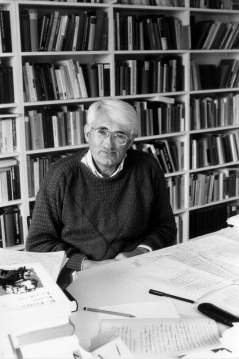On Society and Politics
On Society and Politics
 Jurgen Habermas represents the second wave of Critical Theory. He was
not a contemporary of the other members of the Frankfurt school However, he is
included in the school of thought because his work continues the critique that
the others began. Habermas has written more, and added more to Marxist theory
that all the other members of the Frankfurt school. In his work Towards
Reconstructing Historical
Materialism, Habermas laid out his primary differences with Marx.
Jurgen Habermas represents the second wave of Critical Theory. He was
not a contemporary of the other members of the Frankfurt school However, he is
included in the school of thought because his work continues the critique that
the others began. Habermas has written more, and added more to Marxist theory
that all the other members of the Frankfurt school. In his work Towards
Reconstructing Historical
Materialism, Habermas laid out his primary differences with Marx.
Habermasís primary difficulty with society is that in modern society human beings lack freedom. His primary difficulty with Marxism is that it fails to consider the scope of this lack of freedom. According to Habermas, Marx leaves out the human element. Marx assessment of human evolution as just an economic progression is far too narrow for Habermas. Jurgen asserts that it is societies that evolve economically, instead of the species, he goes on to say that Historical Materialism assumes a learning process. For Habermas, this process becomes a dynamic element in the move from one epoch to another. Where Marx supposed the move to be linear (one step at a time in a straight line), and deterministic, (with a known end), Habermas said it was unpredictable.
Habermas almost completely eliminated the notions of revolution and class struggle from the theory. Instead of these, he introduces the concept of crisis. The crisis is that modern society is not meeting individual needs and that institutions in society are manipulating individuals. People interact to respond to this crisis and Habermas calls this interaction Communicative Action. Habermas adapted Horkheimerís definition of reason as rationality, then, combines it with the relation based activities that results when humans agree. Communicative action, it is the one type of action, that Habermas says uses all human ways of thinking, and language. This combination allows human beings to understand and agree with one another, to make plans for common action. This coming together and agreeing; communicative action, takes the place of revolution as mode of change. According to Habermas the move from Capitalism to Communism, (if it occurs), will occur as a result of reason and communicative action.
Habermas adds the methodology of psychology and linguistics to his critique, and attempts to move the analysis of Marxism to Social Scientific inquiry. As far a solution, Habermasís approach offers the process of Communicative Action as the solution. He implies that implementing his theory, and analyzing it will address the ills created by modern society. On the whole, Habermasís contribution to the Frankfurt school is significant to say the least. It will undoubtedly be revisited as the philosophical conversation continues.